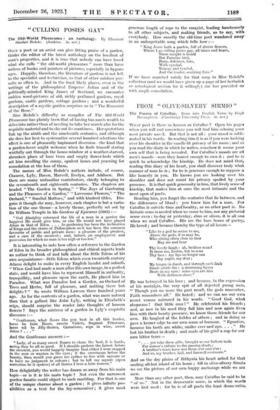"CULLING POSIES GAY"
ONLY a poet or an artist can give fitting praise of a garden, thinks the editor of the latest anthology on the loveliest of man's properties, and it is true that nobody can have loved what she calls " the old-world pleasaunce " more than have writers of books and painters of pictures, especially in bygone ages. Happily, therefore, the literature of gardens is not left to the specialist and technician, as that of other outdoor pur- suits so often is. And in the least likely places, even in the writings of the philosophical Emperor Julian and of the politically-minded King James of Scotland, we encounter sudden word-pictures of old, richly perfumed gardens, royal gardens, castle gardens, cottage gardens ; and a wonderful description of a mystic garden surprises us in The Romaunt of the Rose."
Miss Rohde's difficulty as compiler of The Old-World Pleasaunce has plainly been that of having too much wealth to delve into rather than of needing to take her search afar for the requisite material and to eke out its scantiness. Her quotations link up the ninth and the nineteenth centuries, and although she does her best to systematize several hundred selections the effect is one of pleasantly haphazard diversion—the kind that a garden-lover might welcome when he finds himself staring wistfully out through the house-window at a weather-starved, shrunken place of bare trees and empty flower-beds which set him recalling the sunny, opulent hours and yearning for consolation at the loss of them.
The names of Miss Rohde's authors include, of course, Chaucer, Lyly, Bacon, Marvell, Evelyn, and Addison. But there are many unfamiliar contributors, chiefly belonging to the seventeenth and eighteenth centuries. The chapters are headed " The Garden in Spring," " The Joys of Gardening and the Pleasures of a Garden," " Lovesome Flowers," " The Orchard," " Sundial Mottoes," and with kindred titles. Dis- guise it though she may, however, each chapter is but a varia- tion of the one theme—a lovely theme, perfectly set out by Sir William Temple in his Gardens of Epicurus (1685) :- " God Almighty esteemed the life of a man in a garden the happiest He could give him, or else He would not have placed Adam in that of Eden. . . . As gardening has been the inclination of Kings and the choice of Philosophers so it has been the common favourite of public and private men : a pleasure of the greatest, and a care of the meanest ; and, indeed, an employment and possession for which no man is too high or too low."
It is interesting to note how often a reference to the Garden of Eden in its broader philosophical and ethical aspects leads an author to think of and talk about the little Edens of his own acquaintance—little Edens which even twentieth century Adams delight to make in every English hamlet and suburb. " When God had made a man after His own image, in a perfect state, and would have him to represent Himself in authority, tranquillity, and pleasure upon the earth, He placed him in Paradise. What was Paradise but a Garden, an Orchard of Trees and Herbs, full of pleasure, and nothing there but delights ? " So wrote William Lawson three hundred years ago. As for the contents of a garden, what was more natural than that a gallant like John Lyly, writing in Elizabeth's reign, should surprise the reader into thoughts of human flowers ? Says the mistress of a garden in Lyly's exquisite discourse :-
"Gentleman, what floure like you best in all this border, heere be faire Roses, sweeto Violets, fragrant Primroses, heere wil be Jilly-floures, Carnations, sops in wine, sweet Johns ? . . . "
And the Gentleman answers :-
"Lady, of so many sweet floures to chuse the best, it is horde, seeing they be all so good. If I shoulde preferre the fairest before the sweetest, you would happely imagine that either I were stopped in the nose or wanton in the eyes ; if the sweetness° before the beauty, then would you guess mo eyther to live with savours or to have no judgment in colours ; but to tell my mynde (upon correction be it spoken) of all floures I love a faire woman."
How delightfully the writer has drawn us away from-his main topic—or is it to his main topic ? Not even the narrowest garden fanatic could object to such rambling. For that is one of the unique charms about a garden ; it gives infinite pos- sibilities as a text for the lay-sermoniser ; it gives most
generous length of rope to the essayist, leading handsomely to all other subjects, and making friends, so to say, with everybody. How sweetly the old-time poet wandered away in an unforgettable song which tells how :-
"King Jesus bath a garden, full of divers flowers,
Where I go culling posies gay, all times and hours, There naught is heard But Paradise bird, Harp dulcimer, lute, , With► cymbal, Trump, and tymhal, And the tender, soothing flute."
If we have searched vainly for that song in Miss Rohde's collection (and we would have given up a page of her herbalist or astrological section for it willingly) she has provided us with ample consolation.






































 Previous page
Previous page